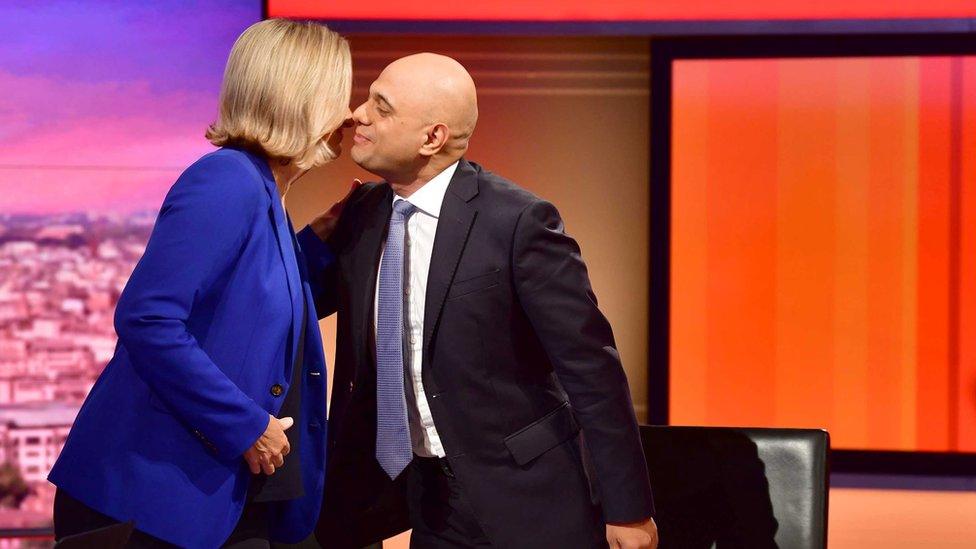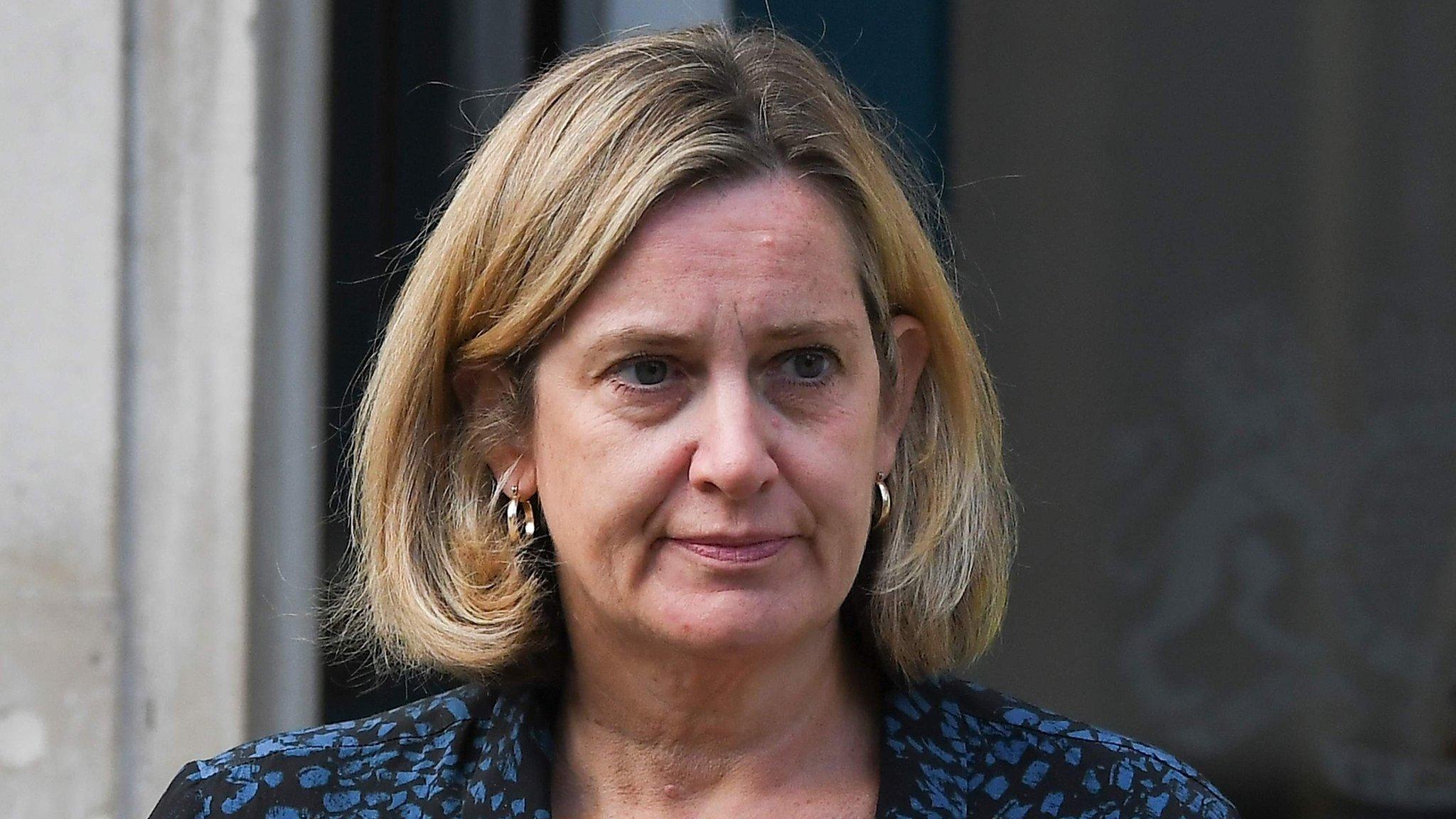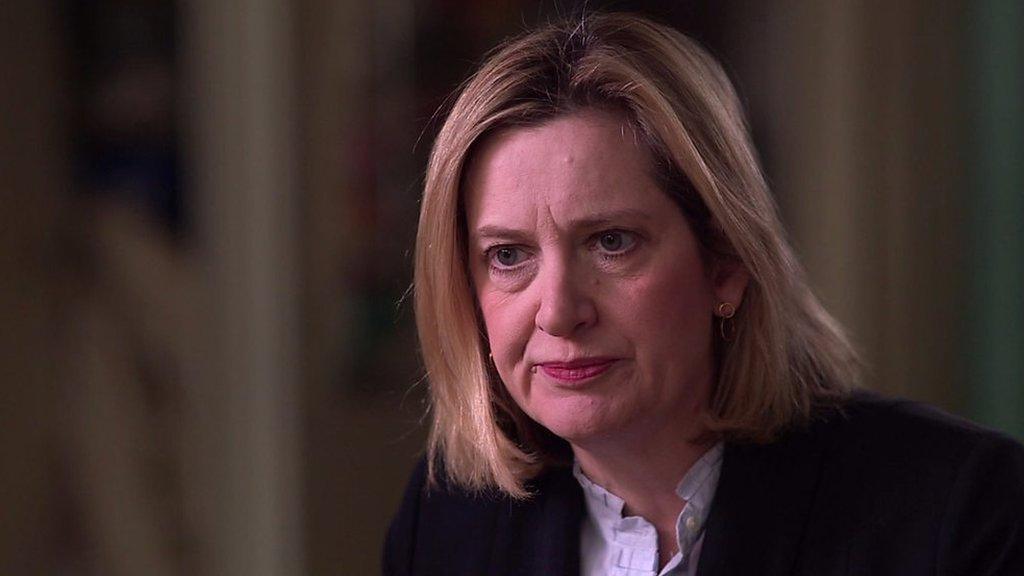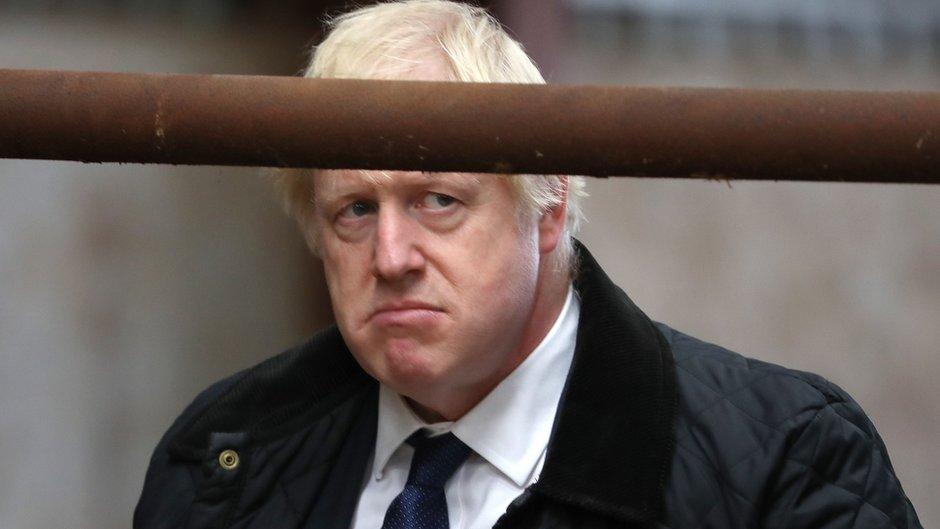Amber Rudd quits cabinet blaming Brexit inaction
- Published
Amber Rudd: "80-90% of government time is going into preparing for no-deal"
Amber Rudd has quit Boris Johnson's cabinet, with an outspoken attack on the government's approach to Brexit.
The ex-work and pensions secretary said the government was having no "formal negotiations" with the EU about a new deal, only "conversations".
Instead, 80-90% of Brexit work was spent preparing for an "inferior" no-deal option, she said.
But Chancellor Sajid Javid said ministers were "straining every sinew" to get a deal with the EU.
He told the BBC's Andrew Marr Show a "tremendous amount of effort" had gone into securing a revised deal.
Mr Javid added that preparations for a no-deal scenario would "concentrate minds" in Europe regarding working towards a new agreement.
Downing Street says environment minister Therese Coffey will replace Ms Rudd as work and pensions secretary.
BBC political correspondent Jonathan Blake said the prime minister spent Sunday meeting his closest advisers at the government's countryside residence Chevening House, in Kent, "perhaps planning the next move".
Ms Rudd told the Sunday Times, external she would be considering whether to stand as an independent Conservative should there be an general election.
In her resignation letter to the prime minister, Ms Rudd said: "I joined your cabinet in good faith: accepting that no-deal had to be on the table, because it was the means by which we would have the best chance of achieving a new deal to leave on 31 October.
"However, I no longer believe leaving with a deal is the government's main objective."
She called the PM's decision to expel 21 MPs from the parliamentary Conservative party an "act of political vandalism", after her former colleagues rebelled last week over a bill designed to avoid a no-deal Brexit.
"If we become a party which has no place for the type of moderates that I am, the centre-right Conservatives, then we will not win [a general election]," she said.

Analysis: 'More ministers contemplating resigning'
by John Pienaar, BBC deputy political editor
Amber Rudd's resignation was symptomatic of a deeper struggle going on inside the government and inside the Conservative Party.
Whatever anyone says, a number of ministers are considered to be privately unhappy with the government's strategy and contemplating the possibility of resigning in the wake of Amber Rudd's resignation.
The former chancellor, Philip Hammond, was saying this weekend that usurpers were turning the Tory party into an extreme right-wing sect.
He was clearly referring to people like the prime minister's famously abrasive, divisive adviser, Dominic Cummings.
But there's no sign of the inner circle in No 10 relenting or repenting - just the opposite.
One minister said to me today: "Look at the opinion polls. Tories well ahead - it's working." Losing colleagues, to him, was collateral damage.

Ms Rudd, the MP for Hastings and Rye, who supported Remain in the 2016 referendum, has resigned the Tory whip - meaning she will remain an MP but no longer sit as part of the Conservative party in Parliament.
She told the BBC there was "very little evidence" the government would get a new Brexit deal, and she had only received a "one-page summary" of efforts to get an agreement when she asked for details earlier this week.
She said "proper discussions about policy" had not been taking place, suggesting senior ministers had limited involvement in the PM's decisions.
Cabinet ministers had also not been shown legal advice to the prime minister about his decision to prorogue - or suspend - Parliament from next week until 14 October, Ms Rudd said.
Asked who was running the country, if not the cabinet, she replied: "If I knew that, I would perhaps have had further conversations with the prime minister, or them."

Mr Javid said Ms Rudd was "my friend, not just my colleague"
However, Mr Javid said there had been "progress" in talks with the EU about making changes to former PM Theresa May's Brexit deal, which was rejected three times by the House of Commons.
He said the government has "many new ideas" for proposals to break the deadlock over the contentious backstop plan in the deal aiming to preserve seamless border on the island of Ireland.
However he said it would be "madness" to talk through the details of the government's proposals openly.
"Anyone who understands how negotiation works, you would not discuss those in public," he added.
What has the reaction been to her resignation?
Former Foreign Secretary Jeremy Hunt said Ms Rudd's departure was "desperately sad news", describing her as "one of the most principled and capable ministers I've worked with".
Former Chancellor Philip Hammond tweeted that the Conservative Party had been "taken over by unelected advisors, entryists and usurpers".
Allow X content?
This article contains content provided by X. We ask for your permission before anything is loaded, as they may be using cookies and other technologies. You may want to read X’s cookie policy, external and privacy policy, external before accepting. To view this content choose ‘accept and continue’.

Shadow Brexit secretary Sir Keir Starmer tweeted, external that her departure showed Mr Johnson's government was "falling apart".
Labour Party chair Ian Lavery said the resignation was a sign that "no one trusts" Mr Johnson. "The prime minister has run out of authority in record time and his Brexit plan has been exposed as a sham," he said.
SNP Westminster leader Ian Blackford called on the prime minister to resign, arguing he had "no support or credibility left".
But Foreign Secretary Dominic Raab said Mr Johnson had made clear to all his cabinet ministers they needed to support his policy of leaving the EU by 31 October, in all circumstances.
"We all accepted that, and I think the prime minister was right to restore some discipline - and I think he's right to expect it from his top team," he told Sky News.
Sajid Javid: "We are working wholeheartedly, straining every sinew, to get a deal"
In other developments:
Senior ministers insist Mr Johnson won't break the new law which says he must seek a Brexit extension from the EU if no new deal has been agreed by 14 October - but the UK will still leave with or without a deal on 31 October
The government is planning - in a breach of convention - to stand a candidate against the Speaker of the Commons, John Bercow, at the next election
French Foreign Minister Jean-Yves Le Drian says France will not be able to support another Brexit delay "in the current circumstances"
Asked to rule out a possible pact with The Brexit Party at a future election, Mr Javid says the Tories "don't need an electoral alliance with anyone"
Former Labour MP Angela Smith has joined the Liberal Democrats, calling them "the strongest party to stop Brexit".

Who is Amber Rudd?
The 56-year old has been MP for Hastings and Rye in East Sussex since 2010
Her majority in the 2017 election was just 346 votes
In the 2016 referendum, she was a Remain supporter - her brother helped to fund the campaign
Ms Rudd was appointed home secretary in July 2016
She resigned as home secretary in 2018 over the Windrush scandal, saying she "inadvertently misled" MPs
But an inquiry concluded she was let down by her officials and she returned to the cabinet as work and pensions secretary months later
Ms Rudd was married for five years to the late journalist and writer AA Gill
An Edinburgh University graduate, she previously worked in banking and recruitment
She was credited as a consultant on the 1994 hit film Four Weddings and a Funeral
In the 2016 Tory leadership debates, she described Boris Johnson as the "life and soul of the party but not the man you want driving you home at the end of the evening".

Who is Therese Coffey?
Ms Coffey was first elected as MP for Suffolk Coastal in 2010
She has held a number of government positions including Commons deputy leader, assistant whip and, most recently, environment minister
She backed Remain in the 2016 referendum and later voted in favour of Theresa May's Brexit deal
However, she has since spoken about the need to honour the referendum result and backed Mr Johnson's Tory leadership bid.

The week ahead
Monday
MPs vote again on whether to trigger an early election - the vote is expected to fail
The cross-party bill designed to prevent a no-deal Brexit on 31 October is set to gain royal assent
Parliament could be prorogued (suspended) until 14 October from Monday but this could happen as late as Thursday
Mr Johnson meets Irish Taoiseach (prime minister) Leo Varadkar
Wednesday:
Mr Johnson is due to appear in front of the Commons' Liaison Committee, made up of the chairs of all select committees, facing questions on Brexit, social policy and climate change
A ruling is expected from Scotland's highest civil court on whether the proroguing of Parliament is illegal, in response to an appeal by a group of MPs and peers
Thursday:
This is the last day Parliament could be prorogued

- Published7 September 2019

- Published24 January 2019

- Published4 September 2019

- Published7 September 2019
